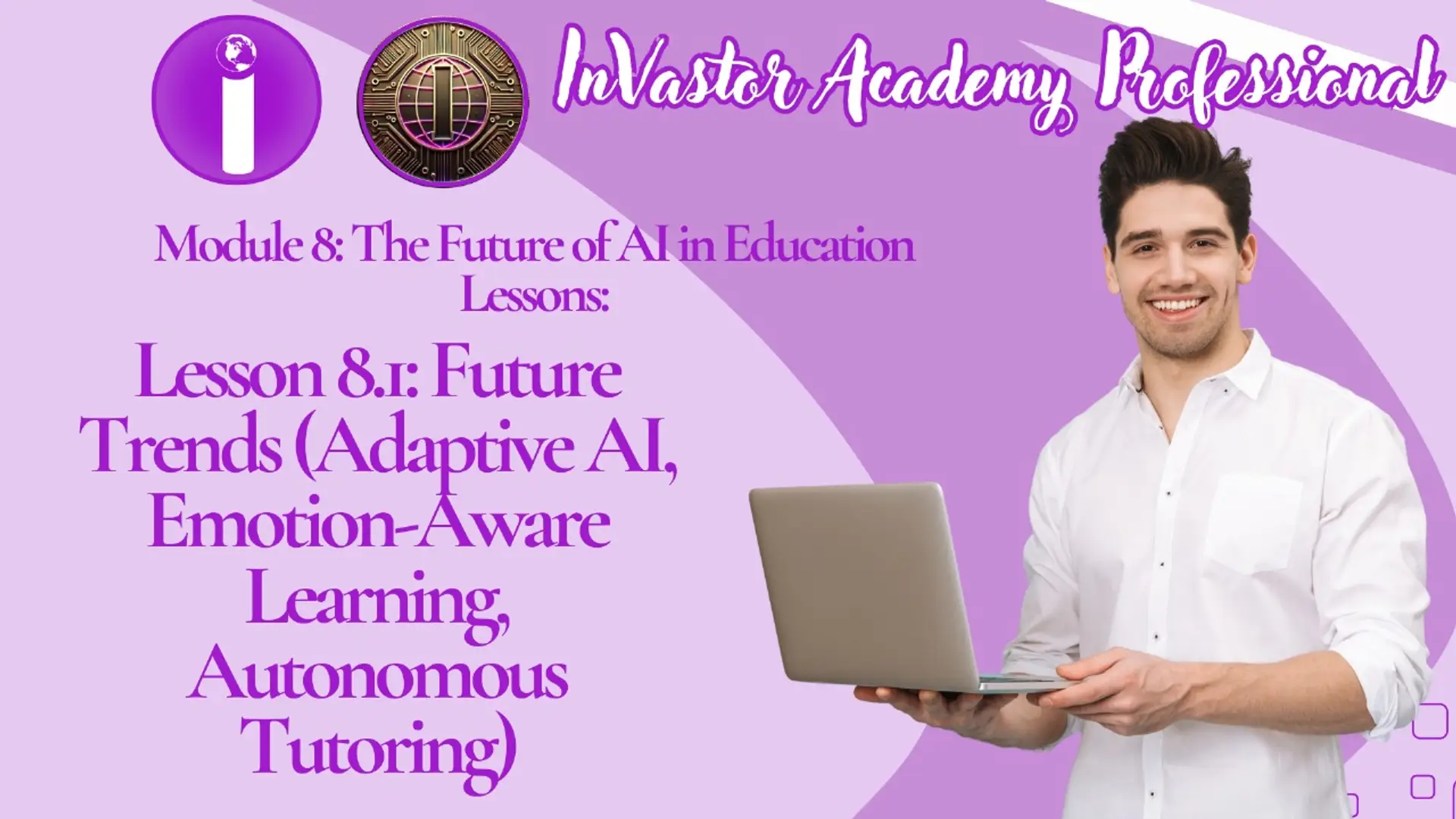

Module 8: The Future of AI in Education Lesson 8.1
Module 8: The Future of AI in Education
Lesson 8.1 — Future Trends (Adaptive AI, Emotion-Aware Learning, Autonomous Tutoring)
Learning Objectives
By the end of this lesson, educators will be able to:
- Describe emerging trends in educational AI, including adaptive learning, emotion-aware technologies, and autonomous tutoring systems.
- Evaluate the potential benefits and challenges of next-generation AI tools in teaching and learning.
- Predict how AI advancements may reshape curriculum design, assessment, and student engagement.
- Identify ethical, social, and equity considerations connected to the use of advanced AI in education.
- Develop strategies to prepare students and teachers for responsible participation in an AI-driven learning ecosystem.
1. The Changing Landscape of Educational AI
AI is evolving rapidly — moving beyond simple chatbots and recommendation systems to tools that can analyze emotions, adapt lessons instantly, and act as independent teaching assistants.
These innovations hold enormous promise for personalization and inclusivity — but also raise new challenges around privacy, fairness, and the role of the human educator.
The three most significant trends shaping the future of AI in education are:
- Adaptive AI Learning Systems
- Emotion-Aware Learning Technologies
- Autonomous AI Tutors and Agents
2. Trend 1: Adaptive AI Learning Systems
Definition:
Adaptive AI refers to systems that personalize learning content and pacing in real time based on each student’s performance, behavior, and preferences.
Example Tools:
- Intelligent tutoring platforms that adjust difficulty as a student masters concepts
- AI-powered language apps (e.g., Duolingo Max) that adapt grammar lessons dynamically
- Math programs that recommend targeted practice areas
Benefits:
- Personalized learning paths for each student
- Real-time performance analytics for teachers
- Improved engagement and reduced learning gaps
Challenges:
- Potential over-reliance on algorithmic decision-making
- Bias in adaptive models due to limited or skewed data
- Privacy risks from constant data collection
Educator Tip:
Always monitor adaptive AI recommendations to ensure they align with curriculum goals and equitable learning outcomes.
3. Trend 2: Emotion-Aware Learning (Affective Computing)
Definition:
Emotion-aware or “affective” AI systems interpret facial expressions, voice tone, or interaction patterns to assess student emotions such as frustration, boredom, or confidence.
Example Tools:
- AI that detects when students are disengaged during virtual lessons
- Emotion-sensing cameras or wearable devices for remote learning environments
- Apps that provide adaptive feedback based on emotional state
Benefits:
- Better understanding of student motivation and well-being
- Early intervention for students struggling emotionally or cognitively
- Enhanced human-AI empathy and responsiveness
Challenges:
- Serious concerns about student surveillance and privacy
- Potential for misinterpretation of emotional cues
- Ethical questions about emotional profiling and consent
Educator Tip:
Use emotion-aware systems only when transparent, consent-based, and clearly beneficial to student support — not as tools for monitoring behavior.
4. Trend 3: Autonomous AI Tutors and Agents
Definition:
Autonomous AI tutors are systems capable of delivering instruction, feedback, and assessments with minimal teacher intervention. They can plan lessons, answer questions, and adapt teaching methods automatically.
Example Tools:
- AI classroom assistants that guide students through self-paced lessons
- Virtual tutors capable of voice-based conversation and concept explanation
- Simulation-based tutors for science labs or language immersion
Benefits:
- Provides 24/7 learning support
- Reduces teacher workload for routine tasks
- Expands access to high-quality tutoring in underserved areas
Challenges:
- Risk of replacing — rather than supporting — human educators
- Dependence on AI accuracy and bias-free performance
- Diminished human connection in the learning process
Educator Tip:
AI tutors should act as co-teachers, not replacements. Human empathy, cultural understanding, and professional judgment remain irreplaceable.
5. Preparing for the Future of AI in Education
Educators can take proactive steps to stay future-ready:
- Stay Informed: Follow AI in education research, conferences, and pilot programs.
- Focus on Human Skills: Emphasize creativity, critical thinking, ethics, and communication — areas AI can support but not replace.
- Promote AI Literacy: Teach students how to use, question, and evaluate AI responsibly.
- Advocate for Equity: Ensure all students have fair access to AI-enhanced learning tools.
- Collaborate with Policymakers: Participate in shaping district and state AI policies for education.
6. Ethical and Equity Considerations

7. Supplementary Resources
- Revolutionizing Education: AI Powered ADAPTIVE LEARNING Explained
- Generative AI in Education: The Future of Teaching and Learning
- The Future of Education: How AI is Personalising Learning
Lesson 8.1 Quiz — Future Trends in Educational AI
Complete the quiz to check your understanding of policy development and ethical frameworks.
You must score at least 70% to pass.
Click here for Quiz 8.1
Conclusion
AI will continue to transform education — but the future depends on how we balance innovation with ethics, privacy, and humanity.
- Adaptive AI will personalize learning.
- Emotion-aware AI will recognize and respond to student needs.
- Autonomous AI tutors will extend learning beyond the classroom.
Yet, the teacher’s role as mentor, guide, and ethical compass remains essential.
Next and Previous Lesson
Next Lesson: 8.2 —Preparing Students for an AI-Empowered Workforce
Previous Lesson: 7.4: Writing a Classroom or School AI Policy
AI for Educators: Personalized Learning & Content Creation
Related Posts
© 2025 Invastor. All Rights Reserved

User Comments